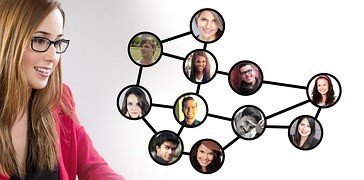Networking: Help Get Yourself Hired or Promoted
Did you know that 70% of all jobs are found through networking? (Source: U.S. Bureau of Labor Statistics) Whether you’re looking for a job or already working, networking is an important skill.
But what is "networking"? Networking is the exchange of information. It’s as simple as:
- A conversation with a friend.

- Talking with someone about your employment goals.
- Sharing information about a great book you read, or emailing an article to someone who you think will like it.
- Talking to others, formally or informally, about things that matter to you.
At its core, networking is about building relationships. These relationships can help you find a job or get promoted to a better paying job.
Why Networking is Important
- People typically reach out to people they know when a position opens up at work. Having a relationship with a friend or colleague who knows the employer or hiring manager can ensure that the employer sees your resume before they see others.
- A job you are qualified for may not be advertised. Employers use word-of-mouth or internal postings about job openings before officially posting them on a website or job board. You may learn of an opening at work that would be a great opportunity for a friend or colleague. Sharing the name of a strong job candidate with the hiring manager shows that you’re a team player invested in the organization’s success.
- Having a strong network shows that you’re committed to your field. You can use it to tap into others’ resources and advance your organization’s goals. It can also lead to a promotion when opportunities arise.
Networking Tips
- Consider your personal networks. We often don’t consider people in our daily lives as part of our network, but they can be helpful in your job search. Think about your relatives, friends, neighbors, colleagues and even acquaintances. Reach out to let them know you’re looking for a job and the type of work you’re seeking. While they may not be able to connect you with a potential employer right away, being aware of your search will help them consider you when they hear of new opportunities.
- Connect with leaders on social media. Being active and engaged on social media platforms like LinkedIn and Twitter could open the door for you to meet hiring managers and recruiters. Each connection brings you one step closer to learning about positions or reaching decision makers.
- Attend in-person gatherings, conferences, and events. Face-to-face contact is an important way to connect with people. Today, there are many opportunities to meet people, get to know others in your field, exchange information, and talk about professional goals.
About Ticket to WorkSocial Security’s Ticket to Work program supports career development for people ages 18 through 64 who receive Social Security disability benefits (SSI or SSDI) and want to work. The Ticket program is free and voluntary. It helps people with disabilities move toward financial independence and connects them with the services and support they need to succeed in the workforce. Learn MoreTo learn more about Ticket Work, visit www.socialsecurity.gov/work, and contact the Ticket to Work Help Line at 1-866-968-7842 (Voice) or 1-866-833-2967 (TTY) Monday through Friday, 8:00 a.m. to 8:00 p.m. ET. Ask a representative to send you a list of service providers or find providers on your own with the Ticket to Work Find Help tool. |
Additional Resources
- Networking is a key part of job hunting (American Job Center Network)
- Networking? Start using social media! (American Job Center Network)
- Skills to Pay the Bills – Networking (U.S. Department of Labor)